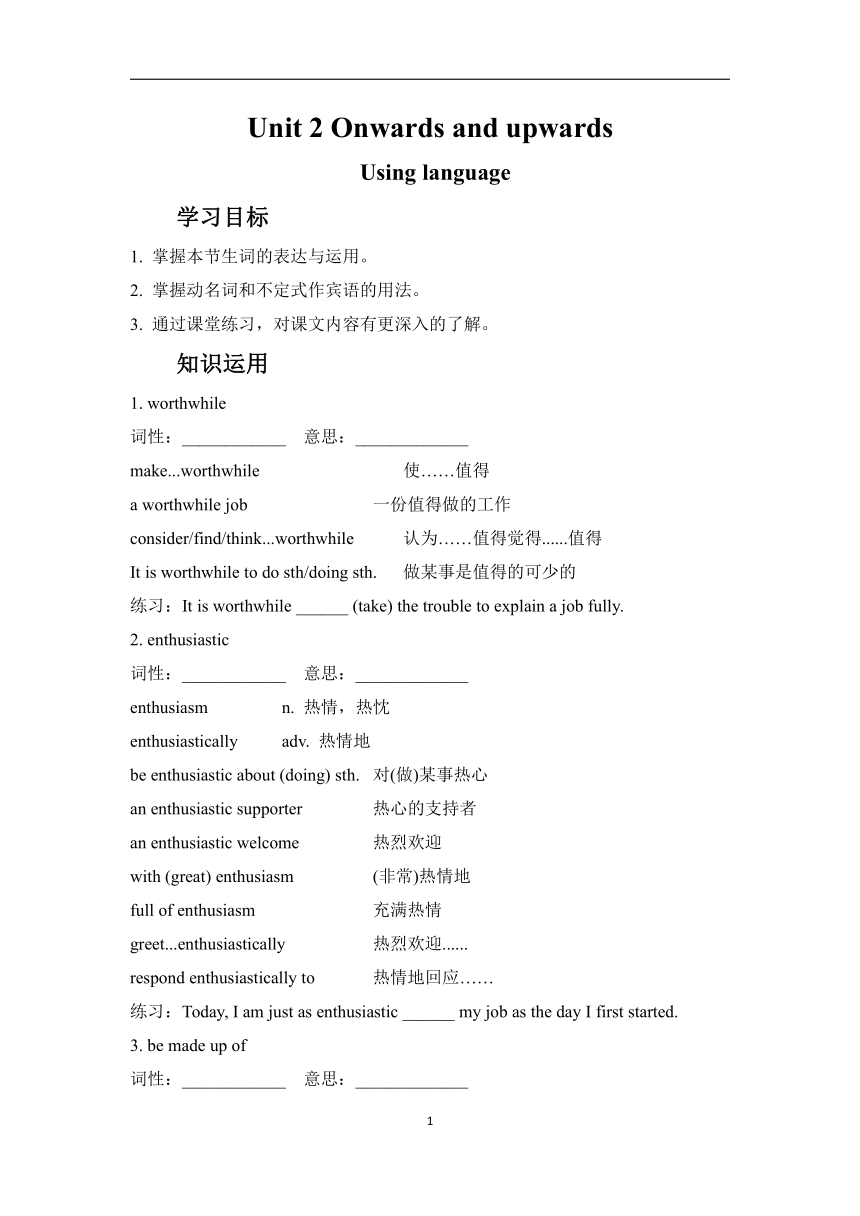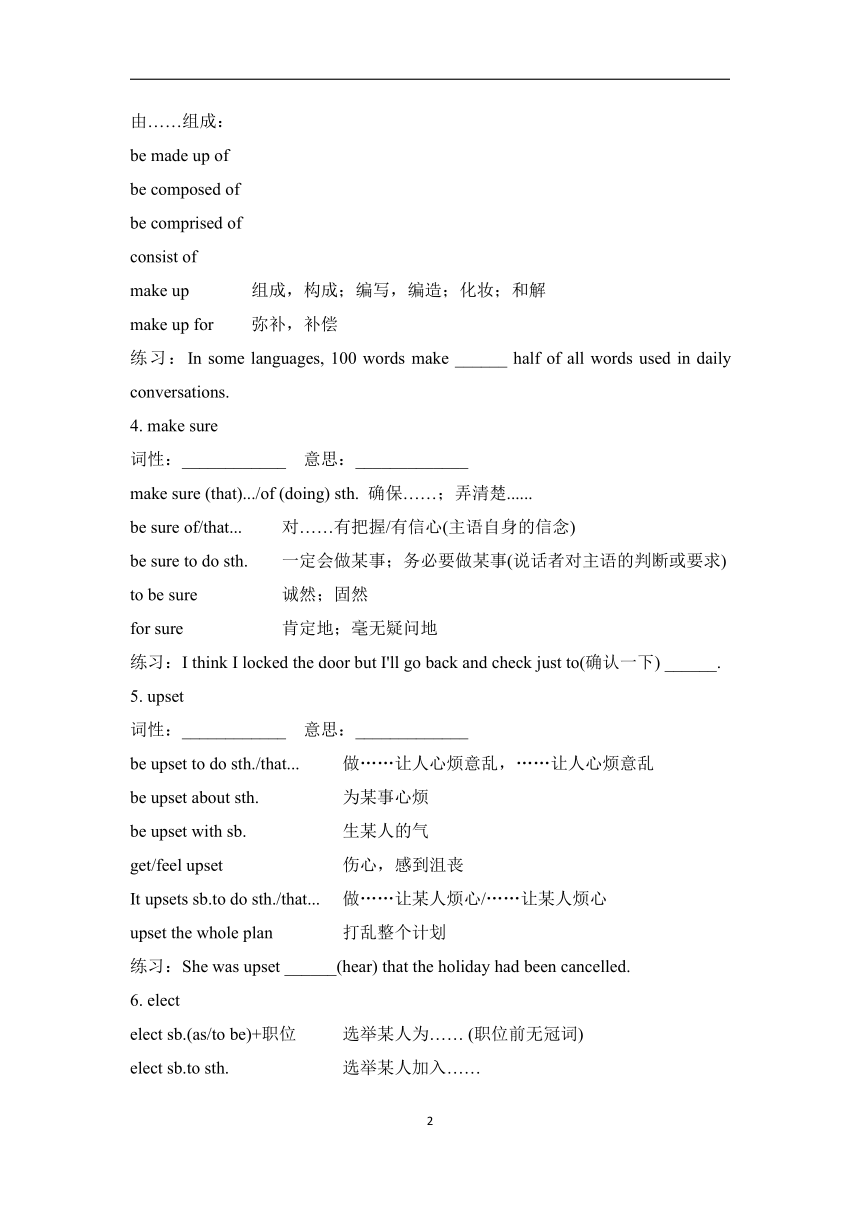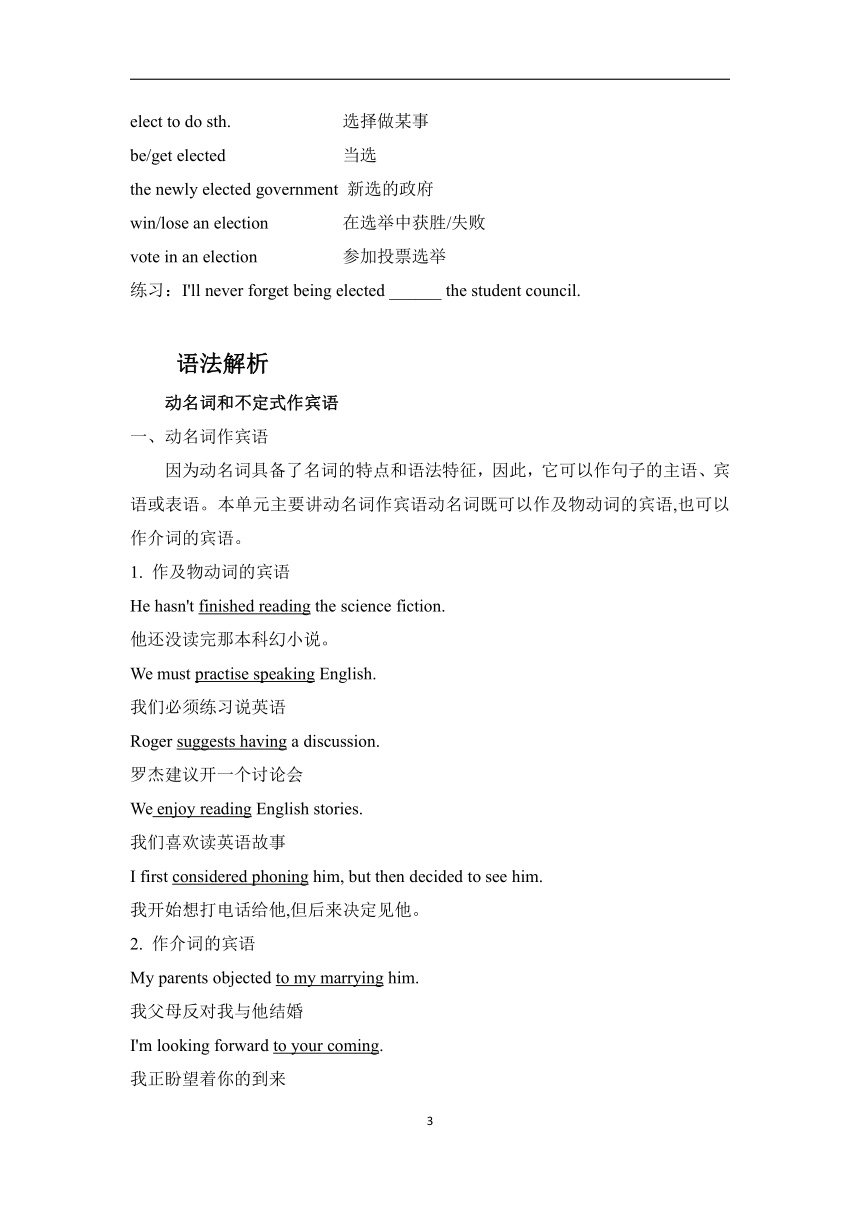外研版(2019)选择性必修 第一册Unit 2 Onwards and upwards Using language 学案(含答案)
文档属性
| 名称 | 外研版(2019)选择性必修 第一册Unit 2 Onwards and upwards Using language 学案(含答案) |  | |
| 格式 | docx | ||
| 文件大小 | 25.2KB | ||
| 资源类型 | 教案 | ||
| 版本资源 | 外研版(2019) | ||
| 科目 | 英语 | ||
| 更新时间 | 2023-10-24 17:37:57 | ||
图片预览



文档简介
Unit 2 Onwards and upwards
Using language
学习目标
1. 掌握本节生词的表达与运用。
2. 掌握动名词和不定式作宾语的用法。
3. 通过课堂练习,对课文内容有更深入的了解。
知识运用
1. worthwhile
词性:____________ 意思:_____________
make...worthwhile 使……值得
a worthwhile job 一份值得做的工作
consider/find/think...worthwhile 认为……值得觉得......值得
It is worthwhile to do sth/doing sth. 做某事是值得的可少的
练习:It is worthwhile ______ (take) the trouble to explain a job fully.
2. enthusiastic
词性:____________ 意思:_____________
enthusiasm n. 热情,热忱
enthusiastically adv. 热情地
be enthusiastic about (doing) sth. 对(做)某事热心
an enthusiastic supporter 热心的支持者
an enthusiastic welcome 热烈欢迎
with (great) enthusiasm (非常)热情地
full of enthusiasm 充满热情
greet...enthusiastically 热烈欢迎......
respond enthusiastically to 热情地回应……
练习:Today, I am just as enthusiastic ______ my job as the day I first started.
3. be made up of
词性:____________ 意思:_____________
由……组成:
be made up of
be composed of
be comprised of
consist of
make up 组成,构成;编写,编造;化妆;和解
make up for 弥补,补偿
练习:In some languages, 100 words make ______ half of all words used in daily conversations.
4. make sure
词性:____________ 意思:_____________
make sure (that).../of (doing) sth. 确保……;弄清楚......
be sure of/that... 对……有把握/有信心(主语自身的信念)
be sure to do sth. 一定会做某事;务必要做某事(说话者对主语的判断或要求)
to be sure 诚然;固然
for sure 肯定地;毫无疑问地
练习:I think I locked the door but I'll go back and check just to(确认一下) ______.
5. upset
词性:____________ 意思:_____________
be upset to do sth./that... 做……让人心烦意乱,……让人心烦意乱
be upset about sth. 为某事心烦
be upset with sb. 生某人的气
get/feel upset 伤心,感到沮丧
It upsets sb.to do sth./that... 做……让某人烦心/……让某人烦心
upset the whole plan 打乱整个计划
练习:She was upset ______(hear) that the holiday had been cancelled.
6. elect
elect sb.(as/to be)+职位 选举某人为…… (职位前无冠词)
elect sb.to sth. 选举某人加入……
elect to do sth. 选择做某事
be/get elected 当选
the newly elected government 新选的政府
win/lose an election 在选举中获胜/失败
vote in an election 参加投票选举
练习:I'll never forget being elected ______ the student council.
语法解析
动名词和不定式作宾语
一、动名词作宾语
因为动名词具备了名词的特点和语法特征,因此,它可以作句子的主语、宾语或表语。本单元主要讲动名词作宾语动名词既可以作及物动词的宾语,也可以作介词的宾语。
1. 作及物动词的宾语
He hasn't finished reading the science fiction.
他还没读完那本科幻小说。
We must practise speaking English.
我们必须练习说英语
Roger suggests having a discussion.
罗杰建议开一个讨论会
We enjoy reading English stories.
我们喜欢读英语故事
I first considered phoning him, but then decided to see him.
我开始想打电话给他,但后来决定见他。
2. 作介词的宾语
My parents objected to my marrying him.
我父母反对我与他结婚
I'm looking forward to your coming.
我正盼望着你的到来
3.动名词作宾语的特征及分析
(1)当谓语表示“承认、否认、放弃、停止、完成”意义时用动名词作宾语。这类动词(短语)主要有admit, deny, give up, quit, stop, finish等。在逻辑上,动名词的动作早于谓语动词的动作。例如:
She admitted driving the car without insurance
她承认驾驶了这辆没有保险的汽车。
The prisoner denies attempting to escape.
犯否认试图逃跑
(2)当谓语动词表示“允许、禁止、介意、反对、避免、阻止”意义时,用动名词作宾语。这些动词主要有 allow, permit, forbid, ban, prohibit, mind, oppose, avoid, escape, prevent等。动名词表示的动作虽然没有确切的发生时间,但都是谓语动词“防范的行为”。动名词与谓语动词相比较,是同时发生的,但不会在谓语动词之后再发生。比如,并不是人们先禁止或避免,宾语的动作后来才发生。
We don't allow making noise here, so you should keep quiet.
这里不允许大声喧哗,所以你应该保持安静。
The rules of the club do not permit smoking.
这个俱乐部的规章不允许吸烟。
(3)当谓语动词表示“延误、推迟、错过、冒险”意义时,用动名词作宾语。这类动词(词组)主要有 delay, put off, postpone, miss, risk等。动名词的动作是这些谓语动词的直接受事者,在谓语动词发生的同时,动名词也在发生。
He delayed telling her the news, waiting for the right moment.
他没有马上把消息告诉她,等有了适当的时机再说。
I put off going to the doctor but I wish I hadn't.
我推迟了去看医生的时间,真希望自己没有这样做
(4)当谓语动词表示“思考、想象、幻想、预期”意义时,用动名词作宾语。这类动词主要有 consider, imagine, fancy, anticipate等。这些动词跟上面的动词相似,动名词是谓语动词的直接受事者。比如,“思考做某事、预测做某事”是指“做某事”是考虑和预测的对象,做某事不是考虑的目的,而是是否发生。fancy 和imagine 一样都是接动名词作宾语。这两个词的主要意思是“人在想象着某件事情正在发生”,这件事情也是自己愿意做的事情,所以里面也包含着想去做的意思,但在未做之前先想象。因此,在想象的过程中,后面的动词也在同时发生,这是动名词的特征之一:与谓语动词同时进行。故使用动名词。
We're considering buying a new car
我们在考虑买一辆新汽车。
She imagined walking into the office and handing in her resignation.
她想象着自己走进办公室,递上辞呈。
(5)当谓语动词表示“承受、忍受抵御禁不住”意义时用动名词作宾语。这类动词(词组)主要有 bear, stand, resist, can't help等。动名词也是谓语动词的直接受事者。
比如,“经受住诱惑”的意思是“诱惑”是经受的对象,是直接宾语。
He can't bear being laughed at.
他无法忍受遭人嘲笑。
He couldn't resist showing off his new car.
他忍不住炫耀起了他的新车。
(6)但也有例外,例如suggest, advise, recommend, advocate 的宾语,也是动名词。其动作是将来发生,为什么不用不定式而要用动名词呢?原因可能是这样的:一般而言,不定式作宾语,必须是句子主语发出的动作。而suggest, advise, recommend, advocate 的宾语的动作,并不是主语自己去做,而是建议、主张别人去做,带有广泛性,就不能用不定式作宾语了,而用动名词。所以,这几个动词后接动名词作宾语。
二、动词不定式作宾语
1.作及物动词的宾语
He wanted to go with you very much.
他很想和你一起去。
How I wish to see my old friends again!
我多么想再见到我的老朋友啊!
特别提示:
动词不定式作宾语,其后跟补足语时,要用it作形式宾语,将不定式放在句末。句型:“谓语动词+it +形容词(名词/名词词组)+不定式”。
I find it difficult to speak English fluently
我觉得要能流利地说英语是很难的。
I felt it hard to communicate with them.
我感觉难以跟他们交流。
He considers it quite foolish to do like that.
他认为那样做很愚蠢。
She made it a rule to get up at six and take a walk in the morning.
她在早晨六点起床然后散步已成为习惯
常用于此句型的谓语动词有: find, think, believe, consider, make, feel等
2.作某些介词的宾语
在 but, except, besides, than等少数几个介词后,可以直接跟动词不定式作宾语。严格讲,介词后只能用动名词。所以,也可以把它们看作连词。
(1) 句中有实义动词do的某种形式时,用不带to的不定式作介词的宾语
What do you like to do besides swim
除了游泳,你还喜欢做什么
He did nothing else than laugh.
他只笑笑而已。
(2) 若but, except 等介词之前没有实义动词 do,而是有其他动词,则 but, except 等介词后要接带 to的动词不定式
He had no choice but to give in.
除了让步,他别无选择。
It had no effect except to make him angry.
除了使他生气,别无效果。
练习:
1. The secret of happiness is worthy of ______ (probe) into.
2. It took her a mere 20 minutes ______ (defeat) her opponent.
3. I need friendship and companionship ______ (maintain) my emotional and physical health.
4. She was beginning ______ (comfort) the orphan with her gentleness.
5. In order ______ (write) your essay well, you should draw up a plan or outline.
6. I woke up at dawn ______ (find) the people were already out in the fields.
答案
知识运用
1. to take/taking 2. about 3. up 4. make sure 5. to hear 6. to
语法解析
1. being probed 2. to defeat 3. to maintain
4. to comfort 5. to write 6. to find
2
Using language
学习目标
1. 掌握本节生词的表达与运用。
2. 掌握动名词和不定式作宾语的用法。
3. 通过课堂练习,对课文内容有更深入的了解。
知识运用
1. worthwhile
词性:____________ 意思:_____________
make...worthwhile 使……值得
a worthwhile job 一份值得做的工作
consider/find/think...worthwhile 认为……值得觉得......值得
It is worthwhile to do sth/doing sth. 做某事是值得的可少的
练习:It is worthwhile ______ (take) the trouble to explain a job fully.
2. enthusiastic
词性:____________ 意思:_____________
enthusiasm n. 热情,热忱
enthusiastically adv. 热情地
be enthusiastic about (doing) sth. 对(做)某事热心
an enthusiastic supporter 热心的支持者
an enthusiastic welcome 热烈欢迎
with (great) enthusiasm (非常)热情地
full of enthusiasm 充满热情
greet...enthusiastically 热烈欢迎......
respond enthusiastically to 热情地回应……
练习:Today, I am just as enthusiastic ______ my job as the day I first started.
3. be made up of
词性:____________ 意思:_____________
由……组成:
be made up of
be composed of
be comprised of
consist of
make up 组成,构成;编写,编造;化妆;和解
make up for 弥补,补偿
练习:In some languages, 100 words make ______ half of all words used in daily conversations.
4. make sure
词性:____________ 意思:_____________
make sure (that).../of (doing) sth. 确保……;弄清楚......
be sure of/that... 对……有把握/有信心(主语自身的信念)
be sure to do sth. 一定会做某事;务必要做某事(说话者对主语的判断或要求)
to be sure 诚然;固然
for sure 肯定地;毫无疑问地
练习:I think I locked the door but I'll go back and check just to(确认一下) ______.
5. upset
词性:____________ 意思:_____________
be upset to do sth./that... 做……让人心烦意乱,……让人心烦意乱
be upset about sth. 为某事心烦
be upset with sb. 生某人的气
get/feel upset 伤心,感到沮丧
It upsets sb.to do sth./that... 做……让某人烦心/……让某人烦心
upset the whole plan 打乱整个计划
练习:She was upset ______(hear) that the holiday had been cancelled.
6. elect
elect sb.(as/to be)+职位 选举某人为…… (职位前无冠词)
elect sb.to sth. 选举某人加入……
elect to do sth. 选择做某事
be/get elected 当选
the newly elected government 新选的政府
win/lose an election 在选举中获胜/失败
vote in an election 参加投票选举
练习:I'll never forget being elected ______ the student council.
语法解析
动名词和不定式作宾语
一、动名词作宾语
因为动名词具备了名词的特点和语法特征,因此,它可以作句子的主语、宾语或表语。本单元主要讲动名词作宾语动名词既可以作及物动词的宾语,也可以作介词的宾语。
1. 作及物动词的宾语
He hasn't finished reading the science fiction.
他还没读完那本科幻小说。
We must practise speaking English.
我们必须练习说英语
Roger suggests having a discussion.
罗杰建议开一个讨论会
We enjoy reading English stories.
我们喜欢读英语故事
I first considered phoning him, but then decided to see him.
我开始想打电话给他,但后来决定见他。
2. 作介词的宾语
My parents objected to my marrying him.
我父母反对我与他结婚
I'm looking forward to your coming.
我正盼望着你的到来
3.动名词作宾语的特征及分析
(1)当谓语表示“承认、否认、放弃、停止、完成”意义时用动名词作宾语。这类动词(短语)主要有admit, deny, give up, quit, stop, finish等。在逻辑上,动名词的动作早于谓语动词的动作。例如:
She admitted driving the car without insurance
她承认驾驶了这辆没有保险的汽车。
The prisoner denies attempting to escape.
犯否认试图逃跑
(2)当谓语动词表示“允许、禁止、介意、反对、避免、阻止”意义时,用动名词作宾语。这些动词主要有 allow, permit, forbid, ban, prohibit, mind, oppose, avoid, escape, prevent等。动名词表示的动作虽然没有确切的发生时间,但都是谓语动词“防范的行为”。动名词与谓语动词相比较,是同时发生的,但不会在谓语动词之后再发生。比如,并不是人们先禁止或避免,宾语的动作后来才发生。
We don't allow making noise here, so you should keep quiet.
这里不允许大声喧哗,所以你应该保持安静。
The rules of the club do not permit smoking.
这个俱乐部的规章不允许吸烟。
(3)当谓语动词表示“延误、推迟、错过、冒险”意义时,用动名词作宾语。这类动词(词组)主要有 delay, put off, postpone, miss, risk等。动名词的动作是这些谓语动词的直接受事者,在谓语动词发生的同时,动名词也在发生。
He delayed telling her the news, waiting for the right moment.
他没有马上把消息告诉她,等有了适当的时机再说。
I put off going to the doctor but I wish I hadn't.
我推迟了去看医生的时间,真希望自己没有这样做
(4)当谓语动词表示“思考、想象、幻想、预期”意义时,用动名词作宾语。这类动词主要有 consider, imagine, fancy, anticipate等。这些动词跟上面的动词相似,动名词是谓语动词的直接受事者。比如,“思考做某事、预测做某事”是指“做某事”是考虑和预测的对象,做某事不是考虑的目的,而是是否发生。fancy 和imagine 一样都是接动名词作宾语。这两个词的主要意思是“人在想象着某件事情正在发生”,这件事情也是自己愿意做的事情,所以里面也包含着想去做的意思,但在未做之前先想象。因此,在想象的过程中,后面的动词也在同时发生,这是动名词的特征之一:与谓语动词同时进行。故使用动名词。
We're considering buying a new car
我们在考虑买一辆新汽车。
She imagined walking into the office and handing in her resignation.
她想象着自己走进办公室,递上辞呈。
(5)当谓语动词表示“承受、忍受抵御禁不住”意义时用动名词作宾语。这类动词(词组)主要有 bear, stand, resist, can't help等。动名词也是谓语动词的直接受事者。
比如,“经受住诱惑”的意思是“诱惑”是经受的对象,是直接宾语。
He can't bear being laughed at.
他无法忍受遭人嘲笑。
He couldn't resist showing off his new car.
他忍不住炫耀起了他的新车。
(6)但也有例外,例如suggest, advise, recommend, advocate 的宾语,也是动名词。其动作是将来发生,为什么不用不定式而要用动名词呢?原因可能是这样的:一般而言,不定式作宾语,必须是句子主语发出的动作。而suggest, advise, recommend, advocate 的宾语的动作,并不是主语自己去做,而是建议、主张别人去做,带有广泛性,就不能用不定式作宾语了,而用动名词。所以,这几个动词后接动名词作宾语。
二、动词不定式作宾语
1.作及物动词的宾语
He wanted to go with you very much.
他很想和你一起去。
How I wish to see my old friends again!
我多么想再见到我的老朋友啊!
特别提示:
动词不定式作宾语,其后跟补足语时,要用it作形式宾语,将不定式放在句末。句型:“谓语动词+it +形容词(名词/名词词组)+不定式”。
I find it difficult to speak English fluently
我觉得要能流利地说英语是很难的。
I felt it hard to communicate with them.
我感觉难以跟他们交流。
He considers it quite foolish to do like that.
他认为那样做很愚蠢。
She made it a rule to get up at six and take a walk in the morning.
她在早晨六点起床然后散步已成为习惯
常用于此句型的谓语动词有: find, think, believe, consider, make, feel等
2.作某些介词的宾语
在 but, except, besides, than等少数几个介词后,可以直接跟动词不定式作宾语。严格讲,介词后只能用动名词。所以,也可以把它们看作连词。
(1) 句中有实义动词do的某种形式时,用不带to的不定式作介词的宾语
What do you like to do besides swim
除了游泳,你还喜欢做什么
He did nothing else than laugh.
他只笑笑而已。
(2) 若but, except 等介词之前没有实义动词 do,而是有其他动词,则 but, except 等介词后要接带 to的动词不定式
He had no choice but to give in.
除了让步,他别无选择。
It had no effect except to make him angry.
除了使他生气,别无效果。
练习:
1. The secret of happiness is worthy of ______ (probe) into.
2. It took her a mere 20 minutes ______ (defeat) her opponent.
3. I need friendship and companionship ______ (maintain) my emotional and physical health.
4. She was beginning ______ (comfort) the orphan with her gentleness.
5. In order ______ (write) your essay well, you should draw up a plan or outline.
6. I woke up at dawn ______ (find) the people were already out in the fields.
答案
知识运用
1. to take/taking 2. about 3. up 4. make sure 5. to hear 6. to
语法解析
1. being probed 2. to defeat 3. to maintain
4. to comfort 5. to write 6. to find
2
